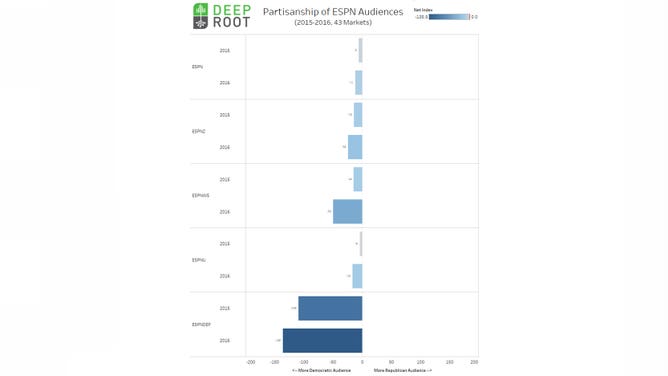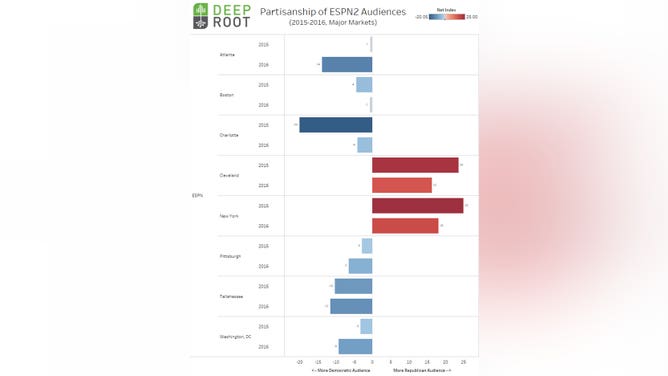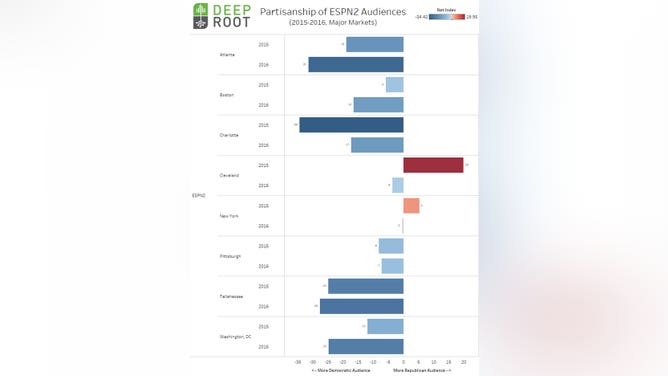Analysis: ESPN Lost Republican Viewers Across the Country in 2016
Special to Outkick by David Seawright:
Two weeks ago, Deep Root Analytics published an analysis of the changing partisanship of ESPN’s audience from 2015 to 2016 with the following key point:
The same week of our analysis, ESPN laid off upwards of 100 employees while facing criticism for becoming more outwardly political in 2016 – a trend publicly acknowledged by ESPN’s public editor.
Our analysis captured a lot of attention, including here on Outkick the Coverage, the Wall Street Journal, POLITICO Magazine, the Washington Examiner and more.
We are able to conduct this analysis because our specialty is measuring how niche audiences – including uniquely political ones – consume TV locally.
We use data to build models that segment the population into political, advocacy and commercial groups and match those segments into observed TV viewership data via set-top boxes and smart TVs. This allows Deep Root to produce customized ratings and indices for every program and daypart on broadcast and cable TV – including data on ESPN’s viewership among loyal Democrats and Republicans.
Of course, the (appropriate) criticism of our analysis was that it was built on a single market’s worth of data. ESPN’s audiences becoming less Republican and more Democratic in Cincinnati is interesting, but can it be connected to a larger trend?
To find out, we aggregated data from 43 markets of varying sizes, including major markets like New York City, Philadelphia and Washington, DC.
All told, the ESPN audience across the network’s channels was already liberal in 2015 – but it became more liberal in 2016 as Republicans stopped watching:
In all, 34 of the markets included in our analysis showed the audience of the flagship ESPN network become less Republican in 2016 compared to 2015; the ESPN audience became more Republican in only 9 of the analyzed markets.
The visualization below outlines the shifts in viewership from 2015 to 2016 across ESPN’s networks:

After looking at this data in the aggregate, we hypothesized that perhaps smaller, more rural markets that have trended much more conservative over the last few years are driving what merely seems to be a national trend.
For example, ESPN’s audience in the Bluefield-Beckley-Oak Hill media market in southern West Virginia became 37% more Democratic in 2016 compared to 2015 – more than any other market in our analysis. That said, about 75% of this market voted for President Trump, so it could stand to reason that more partisan Republican markets skewed the hardest against ESPN, thus driving the national trend visualized above.
The data contradicts this hypothesis. Take New York City as an example. Not only is this the largest media market in the country, but it is also extremely liberal – only 36% of the media market voted for President Trump in 2016. Even still, the ESPN audience in New York skewed conservative in both 2015 and 2016, but became 7% less Republican in 2016.
A similar trend is apparent in other major markets included in our analysis: ESPN’s audience in Atlanta became 13% less Republican, in Cleveland it became 8% less Republican, in Pittsburgh it became 4% more Democratic, in Tallahassee it became 2% more Democratic and in Washington DC it became 6% more Democratic.
Only two of the major markets we analyzed showed the ESPN audience becoming more Republican in 2016: Boston (3% more Republican) and Charlotte (16% more Republican – a more rightward shift than any of the 43 markets included in our analysis).

On ESPN2, the leftward shift of the audience occurred in all of the above major markets except for Charlotte, which again saw the audience move right in 2016 compared to 2015. Cleveland saw the largest leftward shift, with ESPN2’s audience moving from being 20% more Republican to 4% more Democratic in 2016 – a shift of 24 points.

So, what does all this mean for ESPN moving forward? Certainly ESPN’s problems are not purely a result of Republican viewers turning off the network. But with this larger analysis, we do see a clear national trend that ESPN is losing Republican viewers, including in major markets.
At a time where ESPN and the larger cable industry faces changes to its business model as consumption patterns and methods evolve, our data indicates that ESPN is also facing a partisan challenge. Given ESPN’s own admission that it has become more political – and on-the-record comments from ESPN talent saying that the network’s liberal nature is likely driving away viewers – this problem appears to be largely self-inflicted at a time when the network cannot afford to lose any more of its audience.
At Deep Root Analytics, we specialize in local audience understanding, and we are experts in the application of data-driven insights to your media buy. To learn more about our audiences, please visit us at DeepRootAnalytics.com or follow us @DeepRootX. For questions about our analysis on ESPN viewership, contact David Seawright at dseawright@deeprootanalytics.com.